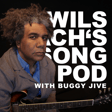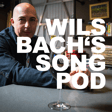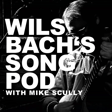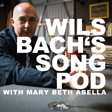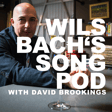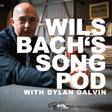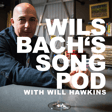Become a Creator today!Start creating today - Share your story with the world!
Start for free
00:00:00
00:00:01

Giovanny Blanco
Giovanny Blanco is a performing artists and songwriter from Los Angeles. He's a force of nature connecting independent artists across Southern California and the world via his Truckstop Mixtape banner. He produces and hosts live events, runs an online radio station, fronts a popular cover band and somehow also finds time to write and record his original music as well.
We have a great conversation about his inspiration and how he brings his songs to life.
Recommended
Transcript
Introduction to Willsbach's Songpod
00:00:01
Speaker
Welcome to Willsbach's Songpod, a show where we dig deep into the songs and artists that move us and how we're moved to craft the songs we write. I'm Tim Willsbach and I write, release and perform music as Willsbach and you can find me anywhere you stream music.
00:00:16
Speaker
Let's dig in. Just a quick programming note for this particular episode, much like our wine and or whiskey fueled discussions backstage, Gio and I grab ahold of several F bombs. So just fair warning, if there are little ears around, you're gonna hear some F bombs.
Introducing Giovanni Blanco
00:00:34
Speaker
Welcome to the inaugural episode, the pilot, if you will, of Will's Box song pod is what we're calling the working title. Much like a hurricane, Force Wind in his beloved Dominican Republic, my guest today is a creative force of nature. He's not only a deeply emotional human who has written, recorded, and released relatable rock and roll soul with his bands, Spiga, The Holy Broken, Blanco and Junk,
00:01:00
Speaker
Shusho, he curates and celebrates new music and artists via his Truck Stop mixtape project, fronts a 70s AM gold cover band, The Dirty Lowdown, and hosts Sunday Night Live at Naboo, a little wine tasting room here in Westlake Village, California. He also hosts the Truck Stop mixtape singer-songwriter Night there, which is actually where we met at Naboo.
Giovanni's Musical Journey
00:01:26
Speaker
Giovanni Blanco, welcome to Willsbox Songpod. So nice to have you.
00:01:30
Speaker
Thank you for the invitation, sir. It's always a pleasure and an honor to be involved in your creative endeavors. Thank you for the beautiful intro and I hope to...
00:01:46
Speaker
to live up to your. Yeah, I'm sure. I'm sure they will. So I mentioned Dominican. You were born in the Dominican or you were born in Brooklyn, New York. I was born in Brooklyn, New York to Dominican parents. And then when I was 10, we we moved there and I lived there from the ages of 10 to 16. And then Hartford after that. Yeah. The geography report is Brooklyn.
00:02:15
Speaker
Boston, Jersey City, New Jersey, Dominican Republic, Hartford, New York, Hartford, and then LA. Gotcha. All right. And that seems like you've been in LA for a while. I've lived in LA more than any other place combined. So that's like the second half of my life.
00:02:38
Speaker
All right.
Forming The Holy Broken
00:02:39
Speaker
So the first the first band I want to talk about is The Holy Broken. Yes. Well, the name The Holy Broken came from a book called The Holy and The Broken. That's about the song. It's about the influence of the song Hallelujah and how Leonard Cohen's version and what's that amazing guy? Yeah, Jeff Buckley. Jeff Buckley. How those versions like the differences in how
00:03:07
Speaker
it's become an anthem in this country for many things that had nothing to do with what the song is about. It's a very interesting book, but the spine itself, the book was called The Holy and the Broken, but for some reason, the only two words that were big were holy and broken. When I saw those two words together, I'm like, that's- Yeah, no, it's a great name. So I put an ad out and Craigslist, I put a picture of
00:03:34
Speaker
The Jay Gauss band in the 70s. You know, six, seven guys who all dress like pimps and they're all crazy and you know, white dudes from Boston and shit like that.
00:03:48
Speaker
I don't know. It just to me was just like, this is like my mind. I see this picture and and crazy long description. And I had many people respond and mainly the responses were like, yeah, I don't understand this. I don't know. Yeah. And Craigslist is a crazy place. Yes. You know, you open that door and it's like.
00:04:08
Speaker
But then one of the responses was like, I like this idea. Can you please give me a call? I didn't call right away, obviously, you know, you have your filtering process. I was just like, I saw the number and I'm like, okay, what's the area code? Where is this person calling from? But five minutes later, I got another email from that same person. And it was just like, wait a minute. It said, wait a minute. Is this GEO? And I'm like,
00:04:35
Speaker
Oh, no, you track me down. How did you get this number? It was Scott Persico. Yeah. Who had said, you know, after after rereading it, I just thought. This is the only person that talks like this, that the way, you know, it had to be Gio and.
00:04:58
Speaker
Sorry, getting a call.
Challenges and Collaborations
00:04:59
Speaker
I'm sorry, do you still have a landline? Is that what I'm hearing? Yes, I do. Wow. I live in Topanga. Okay, tell me, so you don't get sell? The reception here is horrible. Gotcha, so you have to have a landline. To live with a... I just thought it was maybe part of just your 70s kind of aesthetic. Yeah, yeah. I'm picturing like an olive green like handset with the curly cord. With the ring.
00:05:26
Speaker
So Scott Persico, who's an amazing guitarist, by the way, I was listening to some Holy Broken yesterday and just he's so good. And it's funny story about him, just a little sidetrack. He plays those PRS guitars. He's got that awesome tone and he's a great player.
00:05:43
Speaker
I have my own personal Scott Persico that I don't have as much because he lives in Indianapolis. But he's the guy that basically produced, recorded, mixed and mastered my first Wilsbach record in Indianapolis. But he's my Scott Persico. Amazing guitar player. His tone is fantastic.
00:06:07
Speaker
Anyway, so I feel when I when I first met him and talked with him, I'm like, oh, I know you. I don't know you, but I know who you are because I know I know that person anyway. So anyway, Scott Persico, he's he's emailing you. He found you. So, yes, this is approximately six months after we had jammed together in his band. Gotcha. So I called him. It's like I told him the situation. I explained it to him. I'm like, look, I just.
00:06:34
Speaker
I want to write some songs. I want to put a band together. I'm willing to be like, I've got ideas. And he started sending me. He sent me a couple of song ideas, whatever. And the first thing he sent me, I loved immediately. And it was just two parts. Did that end up being a song? What song was that? That was a party.
00:06:53
Speaker
Oh, OK. I love that song. Yeah. And it was just like a four chord progression. And then the other one was just like using some of the same chords, doing a different thing. Right. Yeah. I took the two ideas. Right. And I just started arranging this thing. I found a drum beat that I liked and I just
00:07:15
Speaker
So what he sent you was just guitar. He just sent you guitar. He just sent me like a guitar idea like from an iPhone kind of recording. Okay, gotcha. And I laid out this song, you know, like this song idea and you know, that was a party was in my head. I started singing and the melody that the song became is the melody that I sang that first time and I sent them.
00:07:36
Speaker
back to Scott and he fucking freaked out. It just happened in the last couple of hours. I'm like, yeah, I'm loving this. And it's like, okay, let's get together. But we started jamming and we started writing songs and a week later I called- The Burbank Bar? The Burbank Bar. And she said, yeah, why don't you take this day and whatever. And we took a residency, we played the first one
00:08:03
Speaker
And it was so much fun. And I said, look, here's what's gonna happen.
Songwriting and Live Performance
00:08:09
Speaker
We're gonna do this every month. And every month, if we can't come up with a song to play, a new song that we've written, we're not playing. I love that.
00:08:19
Speaker
I love that. And it just became a thing. Again, back to the deadline thing, right? You're deadline chairman. And we were kind of knocking off songs anyway. We were just trying out ideas. But I feel like people miss out when they release things too soon.
00:08:34
Speaker
There's a recorded thing. You can be a craftsman and be a master in the studio environment and record an idea or make a song and it sounds like a song. But be missing one crucial element, whether it's heart or it's the connectivity to the listener. Playing out a song, even if you're playing it out to two people,
00:08:58
Speaker
That's the true test. Put you in a place, I call it sphincter action. You're so nervous about playing that you're like, even if you've rehearsed it a hundred times or you've rehearsed it once, but something else comes out.
00:09:12
Speaker
It's like some weird thing or the truth comes out. This song is shit. It sounded like okay when I recorded it, but it's wonky or it's this or whatever. And man, this is like no better
00:09:29
Speaker
tests. And it's not even about, like I said, it's not about the audience reception necessarily. It's part of it for me at least. But it's your perception of that. It's like how you react to the audience. But the audience being there is integral to that. Totally. It's the catalyst, right? Yeah, you need that. It's letting go. It's like letting go. And that's when you know, okay, this line didn't work or the solo, it needs this or whatever.
00:09:58
Speaker
I mean, we talk about, you know, we use that word release like a release the song, right? And you know, you recorded it in the studio and you got it pristine and you got, you know, the hand claps exactly where they need to be. And the, you know, the guitars on the right channel and this one's over here. And it's perfect and pristine. And I released it into the world.
00:10:17
Speaker
And then you don't ever get to see how people react to that. But when you're playing it like you're saying, when you're playing it live, you literally are releasing it into the air and into the ear holes of the people who are assembled in a sports bar in Burbank. And they either are going to look at you with passive indifference or they're going to connect to it in some way. But yeah, that's super important to get out and literally release your song into the world and have it bounce back at you and figure out
00:10:46
Speaker
What's working? What isn't? It's crucial. Right, right. So you use that Burbank residency to kind of shape the holy broken songs? Is that?
00:10:56
Speaker
Just to have a reason to keep a band going
Inspiration and Influences
00:11:01
Speaker
almost. Gotcha. Let's go back to that first song from The Holy Broken that Scott sent you. That's definitely one that I wanted to talk about. That was a party. So tell me about the lyric on that one, because that one to me sounds like a very specific time period.
00:11:17
Speaker
in Gio's life. Is that like a high school Hartford kind of thing? Or is it fictional? Is it real? Is it a mix? Tell me about it. It's all real. Look at the lyrics. For me, I'm a big Prince fan. I'm a ridiculously big Prince fan. When I got the song from Scott, it was December of 2015. Okay.
00:11:44
Speaker
I had this, that was a party melody, and we played it out even, and I just sang nonsense. But when Prince died, four months later, and we had played the song a couple of times at that point, but when he died, instantly I knew what the song was about, and the lyrics came out like right away. But I had, the road was already paved. It was already like I knew the turns, I knew the, so everything came out.
00:12:14
Speaker
So the first, and that's on the first verse is when I really discovered, the first time I discovered Prince. And then the second verse is when I was having sort of communal experiences around Prince where like it was a group of friends that we would just go do crazy things and have fun and get high or get loose and with Prince in the background. And the third verse is about how I can't believe that he's gone.
00:12:45
Speaker
And I'm trippin' on the side of the team and the girls Look the same but much older Purple rain in the VCR And by the end we're all a star and we are all a little older
00:13:11
Speaker
I remember the times when we were made That was a party That was a party That was a party I remember the times when we were made That was a party We were made, we were stoned All together
00:13:38
Speaker
There's clearly a story that is relatable in the verse and then the chorus is the gospel of just the general, that was a party, that was such a good time of my life, whatever. It's super relatable. Your vocals on that are incredible. I love that song and the guitar work is great.
00:14:00
Speaker
So that started as just a little piece that Scott sent you that you kind of- Yeah, in garage band of all the recording software. Yeah. And then what a lot of people do these days,
00:14:17
Speaker
Because they do that thing you're talking about. They have the track, and then they just let it roll and repeat. And you sing nonsense until your subconscious goes, wait, what was that? What was that I just put in there? And then you keep massaging it. You, instead of doing that in GarageBand or Logic or whatever, you're doing that once a month at the park bar. Or, yeah, rehearsals. We would record rehearsals. Or whatever. Yeah. It's the same kind of thing.
00:14:43
Speaker
But I've always, I've always written songs that way. And part of that, I mean, lyrics that way. The first band that I was ever in when I came back to the States was
Interpreting Songs and Songwriting Approaches
00:14:53
Speaker
a band called Meaningful Mindlessness in high school. This band was all improvisational. So they would pick a few chords and go down this road. Yeah. We would have to like improvise melody, improvise parts. It's like one thing for you to like listen to like a like a demo recording over and over.
00:15:12
Speaker
It's another when you got live drums behind you, when you've got like something and it's like, as long as you're in key, as long as you're like with the groove, you can do anything. And that short-lived band, which is only like maybe like a year in high school, it was so crucial for the rest of my life because I never,
00:15:32
Speaker
I'm not afraid of that, okay? Just start saying whatever comes to mind, you know? Because it's all it is, it's just words, you know? And I say this, people say, well, it's got to mean something. I'm like, you know what, it does. But how many times have you thought a song meant something and then you heard an interview with the writer and they go, oh, the song is about this and you go like, what? Yeah, right.
00:15:54
Speaker
I mean, that's a good song, right? It leaves that space for the audience member to fill it in and have that emotional connection. And it's just enough of a shape to be like, hey, it's a Warshak test almost, right? Yeah. It completely is. And that's why the first thing needs to be the vibe, because that's the door that opens. Somebody goes in, and once they go in, it's up to them if they want to inspect every aspect of it, or if they just want to go for the ride. Yeah.
00:16:23
Speaker
Reminds me of this Kelly Clarkson interview with Dave Grohl. He's on her talk show. I think you can find this clip on YouTube or something. She asked him about learning to fly. She's taking it as like
00:16:40
Speaker
you know, it's this new beginning and like, you know, learning to walk, learning to fly, all that, you know, it's a song about renewal, right? Yeah, starting over. And she goes on this like, you know, monologue about how much it means to her and, well, what a great thing. And she's like, I think she's assuming, I don't remember, I'd have to look at it again, but I think she's assuming it was born out of like, Nirvana ending and Foo Fighters beginning. And Dave's like, no, that's great. I literally wrote that song about learning how to fly an airplane.
00:17:07
Speaker
So it's like what you're saying. But yeah, to me, that's what makes a really great song is something relatable that you can grab onto as a listener, but you can fill it in. It's almost like one of those coloring books where it's the outline of the picture, but you've got the box of crayons and you can make it abstract or you can make it look exactly like the thing or you can make it weird. You can draw a mustache on it or whatever. Yeah, exactly.
00:17:36
Speaker
Yeah, no, it's as a person who creates or builds anything. Craft is always in the picture. Craft is always there. Yeah. You know, you mentioned Dave Grohl, which is why I thought of it like Dave Grohl for me is like he. He's a craftsman. Right. But but and a master at that and what he does.
00:18:03
Speaker
But I know that initially his, where he comes from is always gut. Yeah. Cause all the songs that no matter how repetitious he may be in his style or like similar, like he, you know, he does a certain thing, right? It's just, it's still like the
00:18:26
Speaker
the edge that we were talking about that sort of like, I'm just going to push it to like wherever, like, you know, whatever the red pops up spiritually. Right. I just like, you know, and I always feel that from him. Yeah. But I know that he's such a master craftsman.
00:18:42
Speaker
that I know what to expect in his songs. You know, like, as far as like, you know, there's gonna be a hook here, this is gonna be, this is gonna be a double chorus, this is gonna be this, this is gonna be a solo, this is gonna be whatever. Yeah, it's like you were saying earlier, you start with the vibe or you start with the mood, or for him, what you're saying, he starts with his gut, whatever he's feeling or whatever, you get that emotion, right? Get that emotion out again, let's throw on the other side of the speaker. But then, yeah, then your craftsman,
00:19:11
Speaker
You know, it's like you're walking along the beach and you find this great, you know, log. I thought you were gonna say dead body, but... Dead body, no. That's a different podcast. Different podcast. That's the murder. There's a lot of murder ones. This is one of my songs. We don't need to add to that. I just found your title, by the way. You did what? I just found the title for your podcast. No murders in this building.
00:19:42
Speaker
That's hilarious. I love it. But yeah, it's a raw material, but you can see like a sculpture in it. And then the crafts part is like taking the knife to it and like carving away and finding out that, oh, it's just a little tiki doll. See, but it started as a washed up, you know, log on the beach.
00:19:59
Speaker
Yeah, I mean, but but we're the washed up log. You know what I mean? It's like that's like I feel like that's why like, you know, you have to you have to. You're the sculptor and the clay is what you're saying. Exactly. So songwriting heroes of yours, you've mentioned Leonard Cohen. You mentioned Prince is obviously a big one for you. Prince is huge songwriting. I mean, there's some I just I love I love.
00:20:24
Speaker
I love pop music, man. Yeah, a nice, a nice tight pop song is what you're. Oh, my God. Yeah, I'm with you on that. There's a song that for me is like one of my top five songs ever written. And it's a song called Don't Give Up On Me. It was recorded or made known to me by an artist named Solomon Burke, who was a singer from the 60s, a song singer who had a sort of resurgence in the early 2000s.
00:20:52
Speaker
when another great songwriter named Joe Henry decided to produce him and release this album called Don't Give Up On Me. That's just raw and emotional. But this song, Don't Give Up On Me was actually written by a guy named Dan Penn, who is like a legendary songwriter who I didn't really know anything about, but I knew like a bunch of his songs. And once I made that connection,
00:21:19
Speaker
I was like, oh, and I see, man, I can hear and feel, you know, like he wrote, Cry Like a Man, he wrote, I'm Your Puppet. That's like such a famous like 60 song. He wrote, Dark End of the Street, which is another amazing, you know, these are all like old soul songs. And it was just like, he was a white boy from Alabama. His thing is his honesty. It's just like very straightforward.
00:21:49
Speaker
I don't have necessarily any songwriting heroes. I love Tom Petty because his songs are so deceivingly straightforward and he loves cowboy chords. He doesn't fucking around with fancy chords or anything, but he finds ways of keeping things interesting.
00:22:11
Speaker
You've totally nailed it. Tom Petty is the master of a simple, relatable, emotional truth. He's got cool in the, you know, grasp on cool. Yeah, totally a master of the pop rock song for sure.
00:22:27
Speaker
What would you call the music that you write? In my intro, I called you rock and roll soul.
Giovanni's Music Style and Industry Insights
00:22:33
Speaker
That's my banner, man. Rock and soul. I mean, I would definitely say that. Rock and soul. But I love all kinds of music. I mean, it's not a genre specific. But you're writing songs that would fit on the radio somewhere. That's it. Yeah. To me, it's always like, even if it's like a dark song, it's like I always want like
00:22:52
Speaker
Where's the hook? What's the part that people are gonna sing? You're writing for hooks, teach the people how to sing along as soon as they can. And I don't think that anybody goes in.
00:23:06
Speaker
with that, you know what I mean? You don't go in like, okay, let me find this hook. You know what I mean? It's like, you do what you do. That's how I do it. You do what you do. I don't know that anybody does that. I think a lot of the top 40 stuff is, you know, when you go and you look and see who wrote it and there's 12 different writers and not that this is bad or good or I'm just saying that there definitely is a science to some of it. And there are absolutely people who are
00:23:33
Speaker
dialing in every tiny little aspect of every piece and part of the song. I think that it's mainly because the sort of like devaluation of what songwriting means in the sense of, let's put it in another aspect. Let's say you're an architect and you wrote the plans for a house and you drew up the plans for a house.
00:23:58
Speaker
And here comes the construction crew, the contractors, and they build the house according to your plans. Your plan might've said, you know what, the walls are gonna be white, and the contractor might've gone, I'm making them yellow, right? They're your plans. You know what I mean? When the contractor decides to paint the house yellow, that's a choice.
00:24:27
Speaker
In the same way, if a drummer decides to lean forward on the beat or add an extra kick, and you wrote out, this is the tempo, this is whatever, and the drummer's gonna go, dude, hey, I added that extra kick, so I kind of co-wrote the song. That's what's happening in music today.
00:24:49
Speaker
because there's so little elements involved that the second somebody goes, you know what? You should say sky instead of ground. Right. They instantly co-write the song. Right. Yeah. It's like what's the saying now? If you were in the room, you're in the room. The producer's going like, you know what? I don't think this is making sense. Maybe you should think about your childhood and the guy
00:25:10
Speaker
the girl writing the song goes, oh yeah, let me bring this up or whatever. And then it's like, the producer doesn't go, I wrote that because I told you that you should, you know what I mean? And I feel like that's what's happening. That everyone was just like, my piece. And all of a sudden there's like, how are there 12 people writing a shitty fucking pop song? There aren't 12 people. There are 12 people in the room because they've got handlers, they've got producers, got assistants. And so everyone's going like, who's my piece? And it's like, fuck you and your piece. Get the fuck out of here.
00:25:40
Speaker
Yeah. Well, it's like, what is a song, right? Like how much of it is, what part of that is arrangement? What part of that, you know, boil it down, what the song is, the melody and the lyric, right? Like, and what you put underneath it, chords, production, all of it, that can all change. That can all change with your producer. And if you're
00:26:02
Speaker
changing up a song that exists and doing it differently, then you're an arranger. You're not a songwriter. Even if you change lyrics to a different language, you're not a songwriter. I mean, it's hard. It's hard to split up a third of a penny.
00:26:19
Speaker
between 12 people. Isn't that what Spotify pays? The fight doesn't exist if there was real money involved. Yeah, exactly. That's the thing. Everybody's just fighting for peace. Thank you for playing this awesome guitar. Here's a ton of money. Yeah. So we talked about the holy broken. We talked about the holy broken. So after the holy broken,
00:26:43
Speaker
ended.
Transition to Blanco and Junk
00:26:44
Speaker
Yes. Then you started Blanco and Junk right away a little bit after and Blanco and Junk is who basically you just you and Jeremy? No, Blanco and Junk is just me and my junk. Okay, I thought Jeremy was I always thought Jeremy was junk. But anyway, Blanco and so Blanco and Junk is is the next project after Holyoke. And Blanco and Junk just really kind of comes out of it's a it's more of a pandemic thing. Yeah, okay. Mainly because
00:27:13
Speaker
Again, I've done most of my stuff in collaboration form, the limitations of being able to kind of be with other people to lock down, put me at a place where I was like, what do I do now? And there were online collaborations, there were things that happened that way separately, not in the same room. But then, I was just like, okay, I just got to start playing
00:27:44
Speaker
And that's how the – that was the impetus for the idea of like, okay, my birthday's coming up. I need to do something. I'm going to write a bunch of songs. And it came about that way. But it's definitely kicked off from –
00:28:00
Speaker
me trying to learn some songs. Yeah. Well, I want to ask you about one in particular. We already had a great discussion about this song, but I didn't hit the record button because I'm a rookie apparently. It's not like I've been doing this kind of thing for 20 years. We don't need to air out the dirty details.
00:28:23
Speaker
It's okay. Nobody knows. Exactly. We'll edit all this out. I do want to ask you about one of the songs on The Emotionalist though. My old mind has gone blank. The only way is the one I wanted to ask you about. If anybody knows your
00:28:42
Speaker
stuff. It's typically, you've got a big voice. You've got an excellent voice. It's usually big, a little bombastic. This particular song stands out to me because it's different. It's not necessarily that kind of traditional geo style. It's a little more kind of subdued, almost
00:29:02
Speaker
talky in places. I can hear that there's something behind that song and I'm drawn to it a little bit. Tell me about how that song came about and just talk about that song. Yes. Initially, the musical element of it came from me trying to learn the song Everybody Knows by Leonard Cohen.
00:29:25
Speaker
I was just trying to find a playing style and somehow I found different chords that I was digging and I came up with this thing. It was just like, oh, okay, cool. But then when I tried to sing on top of it, because of the chords that I chose and where I wanted to go, I felt like I couldn't go high. So I had to kind of talk it. I was already in Leonard Cohen land.
00:29:50
Speaker
But lyrically, the song was partially inspired by the idea behind a phrase that I always like to repeat, which is a song from Sammy Hagar that there's only one way to rock.
00:30:07
Speaker
I never would have guessed that this song came from a Sammy Hagar song. That's an interesting connection. I always loved that idea. When somebody goes, like, how are we going to do this? I always like to say, well, there's only one way to rock. And it's just basically like, how are we going to do this? We're going to do it always with everything we've got. We're going to just lay it all out.
00:30:32
Speaker
not hold back. And and then in that just thinking about that line, it made me think about how that's the same way to kind of like find a truth or or or or push through something difficult. You can't. You can't go at it a little at a time. You can't pretend. You can't half-ass it. You have to kind of
00:31:02
Speaker
bad things happen you have to go through them you have to like feel them inside and out before you actually kind of get over them and that was like the process so as I was I was writing lyrics as I was doing the melody and and this is one of those rare songs where
00:31:23
Speaker
The lyrics and the melody were kind of coming together at the same time as opposed to a song that I live with because in this, a lot of that emotionless stuff I wrote within, I wrote like 14, 15 songs in 10 days and they were all
00:31:42
Speaker
I was writing them. I wasn't like, oh, here's the melody and let me just live with this for a little bit and come back to it. I was writing because the purpose was to record an album on myself.
00:31:56
Speaker
So unlike the Holy Broken, this project where Holy Broken, a lot of those you found in rehearsal or on the stage with the band, Blanco and Junk, is you more kind of brooding artist in your studio, home studio, kind of working it out. And the only person that I had people, I would send, the second I'd finish a song, I'd send
00:32:20
Speaker
songs to people. Like I said, like, hey, can you record a bass line? Listen to this bass and record this keyboard or this piano or whatever. So I had some collaboration in that respect. And in person at the time, I had Jeremy. So Jeremy would come over and be like, look, listen to this. Listen to this fucking awful guitar. Please play something beautiful.
00:32:44
Speaker
And he always came through with the cool riff or the cool vibe. And he was like, he's definitely, if I had a full-on collaborator on that, it was Jeremy. It was Jeremy, gotcha. But that song, the lyrics were coming out.
Emotional Themes in Songwriting
00:33:02
Speaker
But by the time I was done, I realized that it was actually about something else. And it was about, it was like a love letter to my better half. Because it was really a song about
00:33:14
Speaker
Look, you know, I'm crazy. You're crazy. We go through these many different situations and problems. If you're in a long-term relationship, you know, that's ups and downs and anything. But the key is not to give up, not to give up on each other and just to hold on to each other. The only way to get over
00:33:40
Speaker
There ain't no golden ticket, just me and you Ain't no shortcuts to salvation No express line to the truth The only way to get over
00:34:08
Speaker
The only way out is through You better leave your baggage behind There's only room for two There ain't no just in cases or maybes Where the permitting is no excuse
00:34:33
Speaker
So the first verse, I think the only way over, the second verse is the only way out and the last verse is the only way in. But then the bridge says this thing that this is where after the fact, or as I was finishing up, I realized what it was about. If we're in this together, you can't push and I can't pull and we can't hide. Everything is in plain view. If this is supposed to be forever,
00:35:00
Speaker
then there's no better time to light it all up and watch it burn right through. We can always start anew. The only way in is through the only way to rock. And through the line in there, there's only one way to rock. Who knew? Yeah, that's amazing. And it's just like, I don't know. I find sometimes it's said that, this is what I was trying to say before when I said you might agree with me, where sometimes you write a song and
00:35:31
Speaker
I feel like the songs that have connected the most with other people tend to be the songs that I thought about the less as I was writing them. Yeah. And this was definitely one of them, that when I was done, I was done. I was like, oh, OK, the song is about this. And I knew it had something. I knew there was something special to it. But I didn't know. And it's the song from the Blanco and Junk stuff.
00:35:59
Speaker
kind of people come back to you and they always like go like, Hey, you know, like I've had, um, you're saying this, this, the only way is the one that people connect to. Yeah. Like I've had friends repost a song and then send me, uh, comments from people who are in the industry or whatever. They're like, you know, like,
00:36:20
Speaker
Who did this? It was released this right away. I'm like, it's released. It's out there. It's in the world. What are you waiting for? Listen to the damn thing. Stuff like that. Yeah. I mean, there's a song, too. There's another song that that I feel very strong about in. There was a holy broken song called East Side Fade Away. And it was another song that was just like
00:36:50
Speaker
it was built on the most delicate thread of just two guitar chords going over and over that Scott had played. It was one of those little things that he had sent me. The song came out of this idea that the Eastside always gets to shade.
00:37:11
Speaker
because it's going in one direction. It gets the same amount. I'm saying it doesn't mean I'm not trying to prove some sort of scientific theory here. It's like saying like, hey, you and I are standing together and someone says, you guys are great. But then they go to you first and like, you're really good. And they go, you're all right too. You know what I mean? And I feel like the east side kind of because of the direction of where the sun is going. It's like just this, I don't know, just like the idea that
00:37:40
Speaker
somehow you're not good enough. You know what I mean? That even then, that you're doing the things that you're supposed to do. You're killing it. You're doing the thing. And somehow,
00:37:51
Speaker
you're not seen or felt in high regard as your peer or as the other person is doing the same or less than you. And I got bogged down with that because I know that it's a feeling that we always feel. Comparison is a thief of joy kind of thing, right? Yeah, it's like, you know, why I'm doing the same thing that this next person is doing. Why am I not getting... Yeah.
00:38:17
Speaker
I feel that for sure. So you're saying people have connected to that? It's a song that when we in the holy broken in the first year or two, we were together, we would play that song and after the shows, someone would come up to me and say, I've had people say like, what the fuck was that song? I was crying when I was hearing that song.
00:38:41
Speaker
And I'm about to cry thinking of just not thinking about the song, but thinking about that reaction, like how that affected me. Because I don't know, it's like you don't know.
00:38:53
Speaker
as you're doing it, because you don't approach songs differently. You know what I mean? Like, you're going back to the semi anger thing. You're always fucking going in, man, with all you got and the best that you feel that you have at the moment. It's like, you don't ever go like, you know what, this song, this is too much good for this song. Let me pull back. You never do that. You might pull back in an element, but you never go, this song, you know, it's too good. Let me fucking, you know.
00:39:22
Speaker
Yeah, I mean, if anything, you're protecting the other way, right? At least for me. I know, especially early in my career of songwriting, I would have an emotion that I would want to get out there, but I'm like, I don't want to say the thing because that's too...
00:39:38
Speaker
to opening up, right? I'm going to hide it behind some overly poetic line that I think sounds cool. And then what ends up happening is nobody knows what the fuck the song is about because you never actually said what the song is about. My growth as a writer, I hope anyway, has been, I know it has, it has been to be a little more open and be a little more simple. Be a little more Tom Petty about it, right? Straightforward. Straightforward. Here's the thing. Authentic.
00:40:08
Speaker
be authentic. And that's that kind of thing that connects with people, which is what you're seeing and reacting to when you play that Eastside fadeaway song. And a lot of it is just like getting out of your own way.
Authenticity in Music and Community Engagement
00:40:23
Speaker
You know what I mean? Like I said, the ideas of concepts of how things should be done, sometimes they can bog you down or you feel like whatever. And, you know,
00:40:35
Speaker
Craft doesn't come first. I try not to go in knowing what I'm doing or what I'm writing about. It just kind of rolls out. And then sometimes it's all there. Sometimes it's like, you know what, what is, oh, okay.
00:40:51
Speaker
this word needs to be different because what I'm saying is this. Right. And you change the one thing, whatever. Yeah. It's like what's that saying? Write, write drunk, edit sober. Right. Right. That's right. Like write that fucking first draft completely. Yeah. Just get it out there. Get it on the page. Yeah. Yeah. But the last verse of the song for me like revealed to me why maybe these things weren't happening to me and and and
00:41:21
Speaker
And it's not that they're not happening because we all get accolades. We all get those moments where people are like appreciating what we do. And that's the truth. But sometimes you don't feel that way. And and when you don't feel that way, it's because you're looking for the wrong thing. Yeah, it's like it's because you're looking for that and you shouldn't be looking for that. You should never be looking for someone to pat you on the back. You should never be looking for approval.
00:41:47
Speaker
for your own self-expression, you know what I mean? You should just be doing it and look for, hopefully, a connection, but not like somebody going like, that was cool. I broke a heart two times with maybe three Because I thought you would stay I convinced myself I was stoned When I knew deep down inside I was just claimed
00:42:40
Speaker
To me it's because the second you tried to fucking manipulate that in a way that
00:42:49
Speaker
If you're looking for honest outcome for anything, you have to go in honest. You can't go in like, let me manipulate this so it gets this sort of like, let me push this button in a way so it does this. You get out what you put in, period. And that sounds as simple as fuck, but I don't know. That was my realization for this song. But anyway, another thing that I wanted to say about this song is that
00:43:18
Speaker
As you know, during the lockdown, I had this thing called Truck Stop Mixtape, the weekly live stream I was doing. I called it that, where I was just sharing music from all the people that I knew and friends of friends online that were making music and doing things in the lockdown or being creative. And I was just sharing that. And there was this one artist and singer named Frank Watkinson in the UK.
00:43:43
Speaker
who I fell in love with and he was just doing covers of songs and he would just turn every song, any song, into the most depressing song ever in that way possible. And I interviewed him and whatever and he asked me about that song and he fucking covered it. And like this guy just fucking took the song and like destroyed it, like just made it his own. What a great compliment.
00:44:08
Speaker
Yeah, and and it's one of those things that, you know, when you when we as songwriters, we do these things, we put these things out or anybody creative put things out. Is that you really just want.
00:44:22
Speaker
not only for it to be a connection to somebody else or somebody to find something in it, maybe something of their own experience to add to it, but ideally you wanna feel like somebody else has it, or it's part of the world, or it's alive and doing well, had enough in it for it to flourish on its own. Because so many of the things that we do just like,
00:44:52
Speaker
come out in a thud and just like drop and disappear. Yeah. You know what I mean? So it's like, and I'm not saying it's a fame things. Like I said, it's just one person.
00:45:03
Speaker
Yeah. Well, you have definitely affected more than just one person. And specifically our little community, but I think through your truckstop mixtape, it's even bigger than that. You deserve to have a giant, giant audience larger than you do. We all do. But you are absolutely appreciated by, I know this were a fact, a ton of people in this little community
00:45:30
Speaker
And you definitely do connect people and the beautiful music you put out into the world is a gift to everybody. Also a gift is spending all your morning talking to me about
Closing Remarks and Gratitude
00:45:42
Speaker
songs. I thank you so much for being here on the first Willsbox song pod. Let's just call it that for the moment.
00:45:50
Speaker
But, Gio, thank you so much. I've enjoyed, immensely enjoyed this chat. I could talk to you for another two hours. I'm going to have to have you back for a part two. I already know it, so. Yeah, yeah. Likewise. When I get the kinks worked out, I'll have you back on and we'll talk some more. But this has been great. Thank you so much. Thank you. Thank you.
